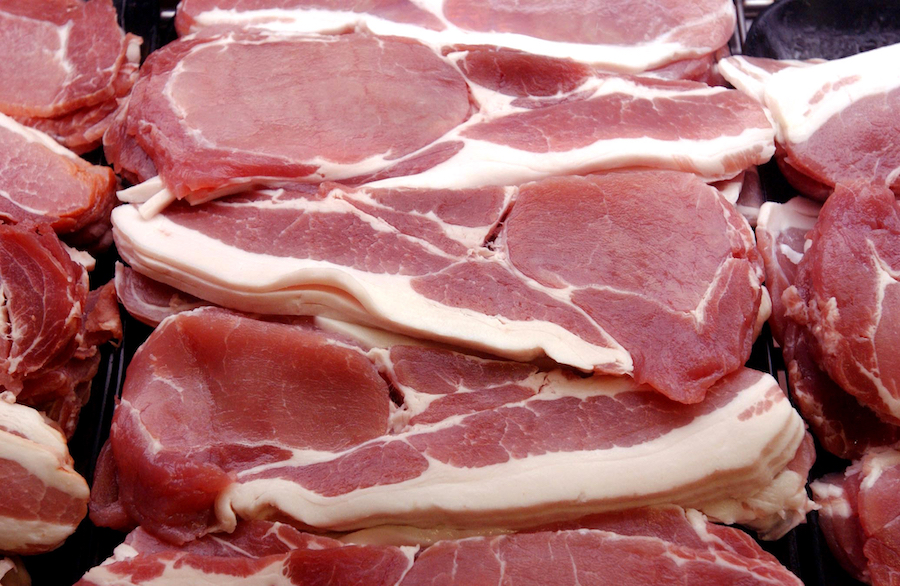Even moderate amounts of bacon and red meat linked to bowel cancer
Even moderate amounts of ham, bacon and and red meat are linked to bowel cancer, experts have warned.
People who stick to NHS guidelines on red and processed meat consumption still increase their risk of bowel cancer by a fifth compared with those who eat very small amounts, a study part-funded by Cancer Research UK found.
The Department of Health said that while meat is a good source of protein, vitamins and minerals, people should cut their intake of red and processed meat to about 70g per day, which is the average daily consumption in the UK.
The World Cancer Research Fund (WCRF) said there is strong evidence that eating processed meat (such as salami, bacon and ham) is a cause of bowel cancer, while eating a lot of red meat (such as beef, lamb or pork) also increases the risk.
For the new study, published in the International Journal of Epidemiology, experts examined data from 475,581 people aged 40 to 69 at the start of the study and followed them for an average of 5.7 years.
During this time, 2,609 people developed bowel cancer.
The study found that people consuming an average of 76g per day of red and processed meat had a 20% higher risk of bowel cancer compared with those who ate 21g per day.
For red meat only, the risk was 15% higher for people who ate 54g per day (about one thick slice of roast beef or one lamb chop) on average compared with those who had 8g per day.
For processed meat only, the risk was 19% higher for those who had an average of 29g per day (about one rasher of bacon or a slice of ham) compared with those who had an average of 5g per day.
There was some good news however, with those people having a high intake of fibre from bread and breakfast cereals lowering their risk of bowel cancer by 14%.
Around one in every 15 men and one in every 18 women will develop bowel cancer during their lifetime.
Cancer Research UK’s expert in diet and cancer, Professor Tim Key, who co-authored the study and is deputy director at the University of Oxford’s cancer epidemiology unit, said: “Our results strongly suggest that people who eat red and processed meat four or more times a week have a higher risk of developing bowel cancer than those who eat red and processed meat less than twice a week.
“There’s substantial evidence that red and processed meat are linked to bowel cancer, and the World Health Organisation classifies processed meat as carcinogenic and red meat as probably carcinogenic.
“Most previous research looked at people in the 1990s or earlier, and diets have changed significantly since then, so our study gives a more up-to-date insight that is relevant to meat consumption today.”
Existing evidence points to an increased bowel cancer risk for every 50g of processed meat a person eats per day, but the new study found that risk increases at just 25g per day.
Dr Julie Sharp, Cancer Research UK’s head of health information, said: “The Government guidelines on red and processed meat are general health advice and this study is a reminder that the more you can cut down beyond this, the more you can lower your chances of developing bowel cancer.
“This doesn’t necessarily mean cutting out red and processed meat entirely, but you may want to think about simple ways to reduce how much you have and how often.
“Although breaking habits we’ve had for a long time can be hard, it’s never too late to make healthy changes to our diet.
“You could try doing meat-free Mondays, looking for recipes using fresh chicken and fish, or swapping meat for pulses like beans and lentils in your usual meals.”
Dr Alison Tedstone, chief nutritionist at Public Health England (PHE), said: “Our surveys show that many people consume too much red and processed meat.”
She said reducing the amount of red and processed meat eaten regularly could also cut salt and saturated fat in the diet and decrease the risk of cardiovascular disease.
The Press Association
Latest posts by The Press Association (see all)
- BBC to air two-part Call The Midwife Christmas special - December 23, 2024
- 6 mind sports to exercise your brain and keep you sharp - December 20, 2024
- Quiz: What classic Christmas food or drink are you? - December 20, 2024
- Leftover turkey and watercress pie - December 20, 2024
- Catherine and William choose family shot for Christmas card photograph - December 19, 2024




















